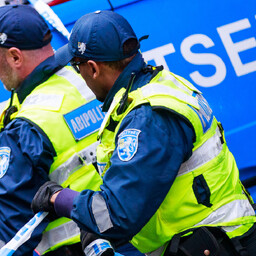Abipolitseinikud on aidanud politseid üle 30 aasta. Praegu saavad nad aidata peamiselt avaliku korra ja
järelevalve töö
s, näiteks patrullides.
järelevalve töö
Tõlge fraasile: järelevalve töö
EN
supervisory work
Siseministeerium tahab nüüd anda neile rohkem ülesandeid. Näiteks võiksid nad tulevikus aidata riigipiiri valvata ja dokumente väljastada. See annaks neile rohkem võimalusi aidata.
Nurmely Mitrahovitš Siseministeeriumist ütleb, et mõned inimesed ei taha patrullida tänaval, kuid tahavad siiski aidata. Uued ülesanded annaksid neile selle võimaluse.
Abipolitseinikud saaksid tulevikus kasutada ka rohkem tööriistu. Näiteks võiksid nad juhtida joobes inimesi alkomeetri juurde või kontrollida inimeste andmeid rahvastikuregistrist.
Leena Pukk politsei juurest ütleb, et politsei töö on laiem kui ainult
patrullimine
. Abipolitseinikud võiksid aidata enne, kui politsei jõuab kohale. See säästaks politsei aega.
patrullimine
Tõlge fraasile: patrullimine
EN
patrolling
Abipolitseinikud ei saa siiski teha politsei kõige tähtsamaid töid, nagu
kuritegude uurimine
. See jääb ikka politseinikele.
kuritegude uurimine
Tõlge fraasile: kuritegude uurimine
EN
crime investigation
Uute ülesannete jaoks peavad
abipolitseinikud
õppima rohkem. Nende
koolitus
kestab tulevikus 150 tundi, mitte 40 tundi.
abipolitseinikud
Tõlge fraasile: abipolitseinikud
EN
assistant police officers
koolitus
Tõlge fraasile: koolitus
EN
training
Abipolitseinikud jagunevad tulevikus kolme tasandile. Mõned ei patrullivad, vaid aitavad kontoris. Teised patrullivad koos teiste abipolitseinikega.
Praegu on abipolitseinikke 1235. Uued reeglid võivad hakata kehtima 2027. aastal.
Auxiliary police officers have been assisting the police for over 30 years. Currently, they mainly help with public order and surveillance work, such as patrolling.
The Ministry of the Interior now wants to give them more tasks. For example, in the future, they could help guard the state border and issue documents. This would give them more opportunities to assist.
Nurmely Mitrahovitš from the Ministry of the Interior says that some people do not want to patrol the street but still want to help. New tasks would give them this opportunity.
Auxiliary police officers could also use more tools in the future. For example, they could guide intoxicated people to an alcoholmeter or check people's data from the population register.
Leena Pukk from the police says that police work is broader than just patrolling. Auxiliary police officers could help before the police arrive. This would save police time.
However, auxiliary police officers cannot perform the most important police tasks, such as investigating crimes. This remains the duty of police officers.
For new tasks, auxiliary police officers will have to learn more. Their training will last 150 hours in the future, instead of 40 hours.
Auxiliary police officers will be divided into three levels in the future. Some will not patrol but help in the office. Others will patrol together with other auxiliary police officers.
Currently, there are 1235 auxiliary police officers. The new rules may come into force in 2027.

